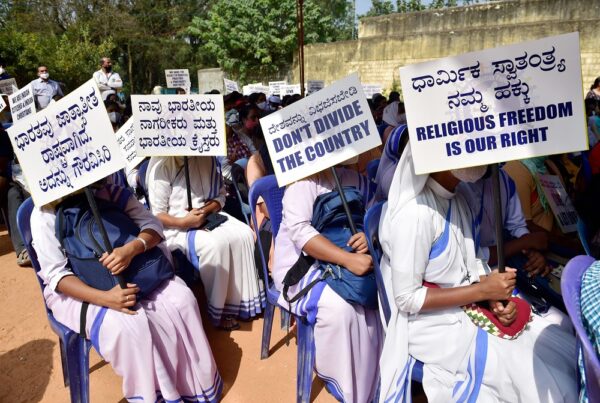Archbishop Peter Machado of Bangalore says he will reveal his position on the new law in court
ACN.- The southwestern Indian state of Karnataka has passed the country’s most restrictive anti-conversion law. On September 15, the state’s upper house, the state Legislative Council, passed the bill, which allows almost anyone to report an alleged forced conversion, reverses the burden of proof and requires no one to raise objections for a conversion to be considered lawful.
The content of the so-called Protection of Right to Freedom of Religion Act is «bitter, brutal and corrosive in nature,» the Bangalore archdiocese said in a statement reported by Alfa y Omega. It was also announced that the bishops of the state, «all Christian leaders and others who defend the secular fabric of our democratic society» are preparing to fight the law in the courts. In fact, they have already filed their objection before the Supreme Court,» so they avoided a more detailed public pronouncement.
It is a rule with «retroactive» effect, with «draconian clauses to terrorize Christians,» denounced Sajan K. George, president of the Global Council of Christians in India. Speaking to Asia News, he explained that a complaint for alleged forced conversion can be filed by the convert himself or by «his parents, siblings or any other person related to him by blood, marriage or adoption». And even someone «associated in any way or a colleague».
Prison sentences
The text «leaves room» for anyone who resents the conversion to «unreasonably harass» anyone he or she considers guilty of conversion. In the face of any complaint, «the burden of proof» is on the accused, who will have to prove that the conversion was not achieved by means of «misrepresentation, force, undue influence, coercion, seduction» (e.g. by promise of material goods), any other fraudulent means or by marriage.
If convicted, he will be punished with three to five years’ imprisonment. To this may be added a fine of between 25,000 and 100,000 rupees (313 -1,300 euros). If the convert is a minor or a woman, is intellectually disabled or belongs to a protected caste or tribe, the sentence can be up to ten years in prison, George added.
This issue is particularly relevant because in India Christianity, a minority in society as a whole (in Karnataka it is less than 2%), has more weight among the lower castes and untouchables, and among marginalized indigenous populations. The Gospel is attractive to those who are generally considered third-rate citizens, and the Church does important work in social promotion and defense of their rights. This is presented by Hindu nationalists as winning conversions in exchange for aid.
Public announcement
In contrast, the process for a conversion to be legally recognized and for those involved not to suffer criminal consequences is very complex. «Whoever wishes to convert and the clergyman» who is going to admit him to his new religion «must file a special form with a district magistrate to give 30 days’ notice,» George explains. In it, he will have to explain the reasons for his decision.
The information will be posted on a public bulletin board to allow objections and allegations to be submitted. This implies that the conversion can only occur if absolutely no one objects to it. Even then, «the convert has to fill in a new form and appear before the magistrate within 21 days to establish his identity and confirm his statement,» says the president of the Global Council of Indian Christians.
The bill had already been approved by the lower house, the Legislative Assembly, in December. In May, the bill was rejected in the Legislative Council by a single vote. However, the state government, in the hands of the Hindu nationalist Bharatiya Janata Party (BJP), passed an ordinance with the same content as the bill, explains UCA News. But according to the Constitution it needed to be ratified by the law within six months, as has now happened.
Peter Machado, archbishop of Bangalore, stated in May that «the Christian community feels betrayed when their sentiments» about the text are not taken note of. «Their selfless services in the field of education, health and other social fields for the welfare of all communities are not taken into account.» The prelate has affirmed that he will reveal his position on the new law in court.


